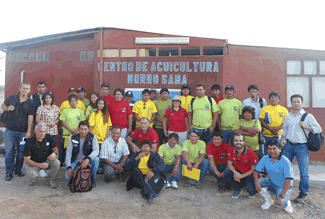
Sustainable development of traditional fishing in Peru is analyzed
To contribute to promote the dialogue between the actors involved in the artisanal sector regarding topics of interest that promote a sustainable development of fishing, the "First Aquiculture Meeting of the Southern Macro Region, for the Sustainable Development of Traditional Fishing " was held on February 25th and 26th in Puerto de Morro Sama in Tacna, in Peru's Southern area.
This activity took place in the framework of the project "Study of the traditional fishing resource in the southern coast of Peru, Phase II", financed by CAF, which is implemented by the Instituto per la Cooperazione Italiana (ICU) (Italian Cooperation Institute) in agreement with the Ministry of Production (PRODUCE), and the cooperation of the Universidad Catolica del Norte in Chile.
The objective of the meeting was to bring together fishermen and professionals from national scientific institutions and from the public sector of the four regions of the southern coast: Ica, Arequipa, Moquegua and Tacna, in a training session regarding issues related to the farming and management of the red sea urchin and macro algae. Another objective was to contribute to the promotion of dialogue between the actors involved in the traditional sector regarding topics of interest that promote the sustainable development of fishing.
Fishermen from the four aforementioned regions participated in the activity, together with technical delegates from the Instituto del Mar of Peru (Institute of the Sea) (Imarpe, for its acronym in Spanish), the Fondo de Desarrollo Pesquero (Fishing Development Fund) (Fondepes, for its acronym in Spanish), the Organismo Nacional de Sanidad Pesquera (National Organization for Fishing Sanitation) (Sanipes, for its acronym in Spanish), representatives from the Ministry of Production and from the Direction of Extraction and Fishing Processing in Tacna and Moquegua, as well as professors and students from the la Universidad de Jorge Basadre in Tacna.
The training sessions were carried out by Luis Pereira, teacher from Chile's Universidad Catolica del Norte; Sheyla Zevallos, biologist from the Imarpe office in Ilo; Ramiro Rojas, general manager of Acuisur; while technicians from PRODUCE lectured on the legal framework for the development of aquiculture in Peru. At the same time, fishermen from different small coves presented their development experiences regarding organizational and aquiculture issues.
In a participative manner, participants determined some of the essential steps that must be complied with in the short-term, such as protection of the environment, the macro regional union, and the establishment of dialogue with institutions in order to achieve fishing sustainability.
CAF's more recent content

CAF, ECLAC, IDB and PAHO Promote Sustainable Development in the G20
The Regional Organizations of the Americas congratulate Brazil on its successful G20 Presidency, highlighting its leadership on key issues such as poverty, governance, and climate change. They also reaffirm their commitment to actions that promote equity and development in the region.
Urgent Call for Action to Safeguard Caribbean SIDS at CAF Symposium
As the global community grapples with the escalating climate crisis, Caribbean Small Island Developing States (SIDS) are running out of time to secure critical investments and support needed to strengthen their economies and protect vulnerable communities from the intensifying impacts of climate change. With the window to take decisive action rapidly shrinking, CAF - Development Bank of Latin America and the Caribbean, in partnership with the Commonwealth Secretariat and the Antigua and Barbuda High Commission, brought together key stakeholders for a symposium in London to address the critical vulnerabilities Caribbean SIDS face.